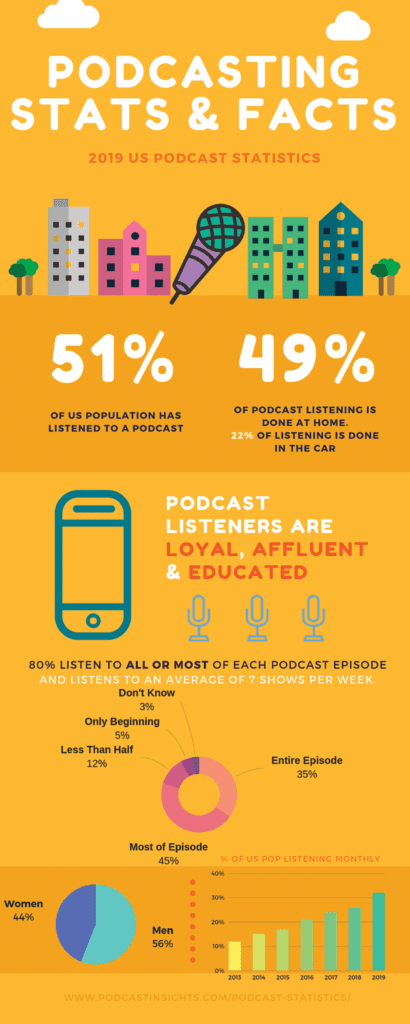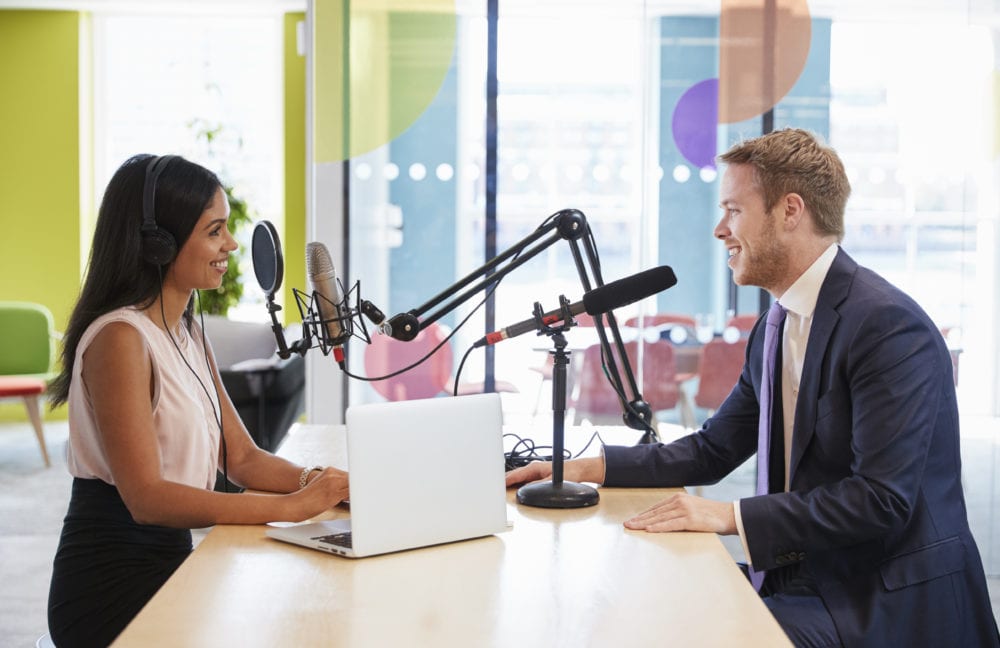Boost Your Influence with a Travel Podcast
Around 48 million Americans listen to podcasts every week. By any measure, that’s a lot of listeners. As a comparison, approximately 20 million people watch NFL Sunday Night Football, which is routinely among the highest-rated television programs. And, in 2018, 6 million more Americans listened to podcasts weekly than in 2017. If that wasn’t enough to get you thinking that this is a medium to get into, try this one: Podcast listeners are more likely to have high net worth—that is, they are your target audience.
To add to the lure of creating a podcast, travel is one of the most underrepresented genres in the field, and the opportunities are huge to be the first to create a travel show for your area. You would have the chance to showcase events, attractions, and places of historical interest and to speak to tourism reps and local people who can talk about places to go and things to see. It’s a niche that needs to be filled.
The statistics are pretty good, and they alone could be enough to start you off on this path. But with so many other social platforms competing for your attention, why should you give your time to developing another that requires far more technical expertise and development time? Although it’s true that it will take resources to get a show set up and published regularly, the reasons to do it far outweigh the additional work required. Here are a few that might convince you:
It is Not a Competitive Platform
Travel is one of the most underserved niches in podcasting, with the field wide open to launch a location-specific podcast that promotes an area through information on local attractions, events, history, and anything else that might entice a listener to visit.
More People are Consuming Information from Podcasts
It’s not just the general podcast consumption statistics that favor looking in this direction. When you drill down into the stats, you can see which listeners are your target audience. Affluent, educated, loyal, and regular travelers—they are the ones most likely to be researching locations online and basing their decisions on the resultant information.
You Become a Local Influencer
The opportunity to be seen as a local expert, and to broadcast that expertise to a wide listening audience, can elevate a podcast brand to an influential resource for travelers. Once you’re established, it’s tough for anyone else to capture your niche, so providing you continue to deliver quality information in an entertaining fashion, you have control over it.
Your Business Can be the Sole Sponsor
A podcast shouldn’t be seen as an overt marketing tool for your business; it’s simply an information resource delivered by a local expert. However, you have complete control over who sponsors the show, and if you choose to have your business as the sponsor, the traffic will flow.
It’s Fun
Few podcasters will tell you it’s a chore—the frequent and consistent publishers enjoy the process and take great satisfaction in their download statistics and the relationships they make along the way.
The success of any podcast lies in knowing your audience and talking their language.
For example, if you are targeting family travelers, you’ll want to bring them relevant information that will make their trip enjoyable, safe, and memorable, while a podcast that focuses more on urban travel might home in on specific places, restaurants, and local vibes.
For example, Beyond Bourbon Street host Mark Bologna shares his knowledge of New Orleans to help visitors make the most of their time in the city. Recent titles include “18 Questions about New Orleans” and “Marie Laveau, a New Orleans Voudou Priestess”—an interview with the author of a book on the role Laveau played in the early 1800s in the city. (Incidentally, this is a great podcast to listen to before your trip to VRMA in October.)
Bruce Fisher is the host of the Hawaii Vacation Connection Podcast and produces short episodes that offer a wealth of tips and recommendations for anyone traveling to the islands. The show covers topical issues such as whether the government shutdown would affect Hawaiian vacations, advice for specific travelers such as family groups and honeymooners, and the best way to travel between the islands. The podcast lives on Fisher’s Hawaii Aloha Travel site, so any listener visiting the show notes can easily access the rest of the site to purchase travel products and accommodations.
The newest podcast on the local travel block is the Inside Vermont Show, launched by the owners of The Nest Chalet. Julie and Keith describe their show as “a non-Vermonter’s guide, sharing why we started coming to Vermont and what keeps us coming back.” Each episode features a lightning round with their guests asking about their favorite places to eat, drink, shop, and see.
What stands out from all these examples is the relaxed style that makes the hosts seem more like friendly guides to the locations—people who listeners might like to meet and get to know. It’s a great form of engagement, and once travelers see you as an influencer, they are much more likely to turn to your recommended resources when booking their next vacation.
If this has got your creative juices flowing, it only takes a few more steps to get a professional podcast out on the airwaves, and although they might seem overwhelming at first, once you are set up and in a pattern of recording, editing, and publishing, it becomes routine.
You can find help online from a variety of sources, from done-for-you services to courses that give step-by-step instructions on buying the right equipment, creating artwork, uploading to hosting services, and marketing.
Podcasting Setup Checklist
Equipment and Software
There’s a lot of equipment out there, but it’s surprisingly easy to create a simple but effective system. If you want to be mobile, you’ll need portable equipment that’s easy to set up while you’re out on the road, so before you buy, be clear on how you plan on recording episodes. My tip is to always record into a digital recorder onto an SD card rather than directly onto a computer. You’ll need:
- A good microphone—ATR2100
- Quality headphones
- Audio interface such as Focusrite Scarlett
- Mid- to high-end XLR cable
- Pop filter
- Audio recorder
- Recording and editing software—Audacity (free), Adobe Audition
- Podcast hosting account—Libsyn
Intro, Outro, and Artwork
Creating a podcast is more than just talking about a topic and uploading the file. A professionally produced show will have intro and outro music and probably a voiceover that describes the show and the host. Don’t try doing this yourself—it’s inexpensive and easy to get one done, and a good one will last for years.
- Voiceovers and artwork—Fiverr.com
- Royalty-free music—Premiumbeat.com, Audiojungle.com
Recording and Editing
You have a choice of whether to record directly into your editing software on a computer or to use a digital recording device and have all your audio material safely held on an SD card until you process it. You’ll need to learn the difference between .WAV and .MP3 files and how to convert one to the other, but it’s a relatively simple process and can be done easily on iTunes. If recording interviews, Skype is probably the easiest podcastermethod.
The free editing platform Audacity is the most popular choice among podcasters. It is simple to use and has enough features to create a professional-sounding result. Other platforms include Garage Band, Adobe Audition, and Hindenburg.
- Recording—Pamela for Skype, Zoom, Zencastr.com
- Editing—Audacity, Garageband, Hindenberg, Adobe Audition
Marketing Your Efforts
Creating your podcast is just the beginning. Unless you want it to hang out in an audio wasteland, you need to find ways to promote the fact you have a show about your area. Teaming up with your tourism authority would be a great place to start, as would promoting it to all your vacation rental guests; whatever you choose, you’ll need a targeted strategy to get the listeners you want and to find sponsors.
- Creation of a separate website or adding a page to an existing site
- Podcast plugin for WP sites—Powerpress plugin by Blubrry
Podcast Training
There can be a steep learning curve to getting a podcast show off the ground, and although you can do it yourself using free tutorials online, it may be worth the expense to get a good education in the meantime. Several excellent courses are out there that give you a solid foundation in podcasting techniques and publishing methods. Here are a few:
- Entrepreneur on Fire—John Lee Dumas & Podcaster’s Paradise
- Smart Passive Income—Power Up Podcasting
- School of Podcasting
I know it can all seem overwhelming, but there is a mountain of online help available from forums and Facebook groups to public training and private coaching. Podcasters are passionate people and super helpful to anyone who wants to get into the medium, so there is always someone available to help. And if you really get into it, there are a wealth of conferences too, the largest of which is Podcast Movement in Orlando in November, where two thousand avid broadcasters get together and share their experiences and knowledge. Maybe I’ll see you there!

Source: https://www.podcastinsights.com/podcast-statistics/
Heather Bayer has been podcasting for four years as the host of the Vacation Rental Success Podcast, a show with more than 450K downloads and 280 episodes.



Mahalo nui for the mention Heather, we started doing Live facebook quotes for Vacations to Hawaii which has worked really well. I go live usually 3 or 4 times a week and do quotes answer question and share info.